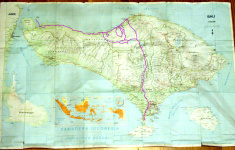
 |
| Route Map |
From the airport in Denpasar, we drove north to the town of Lovina where Wayne was staying. He has worked as an international tour guide for a long time, so he gets to stay in various hotels where he might put up his group next time he has a tour here. The Hotel Puri Bagus Lovina was one of those. It was a bit pricey for me, but for the first night it was great.
The grounds are nice; it's on the beach, and there are palapas or whatever you want to call them on the edge of the beach. They're outfitted with cushions and are a great place to hang out and read or chat. We were waited on hand and foot. Drinks brought, umbrellas held over our heads if we wished. I'm not used to being waited on, so it was pretty decadent for me.
In the photo below, the yellow scarf and black and white checkered cloth are some kind of blessing used to adorn many statues.
 |
| Gary's Balinese Girlfriend |
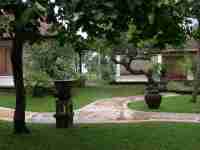 |
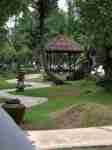 |
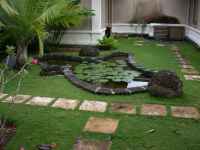 |
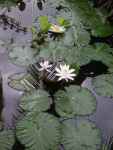 |
| Puri Bagus Lovina grounds | Beach front palapa | Pond near my room | Water lilies |
Bali is predominantly Hindu, and the Hindus have a gazillion gods and goddesses. The Balinese bless everything in sight, five times a day. Gods and goddesses are blessed, trees are blessed, the general landscape is blessed, tools are blessed, homes are blessed, boats are blessed, cars are blessed, and I suppose people are blessed, although I'm not sure about that. In any case, I was never blessed. Maybe that says something. In reality, I was blessed, to be able to visit this wonderful land.
Blessings are sometimes just flowers scattered about or arranged in a bowl, and other times a small arrangement of leaves and flowers. There is often a stick of incense burning near a blessing. I'm not sure what the incense is for, but it gives everything an exotic far eastern flavor; appropriate, given we were in the Far East....
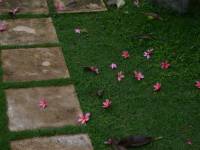 |
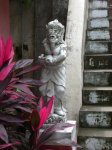 |
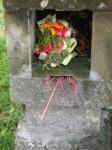 |
| A Blessing of Flowers | Statue | Blessing under statue |
From the beach, you can see the island of Java to the west. In the morning, fishermen take their nets out in their outriggers.
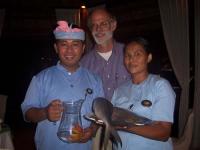 |
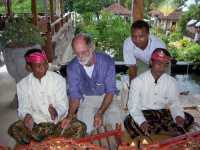 |
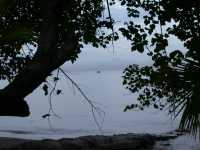 |
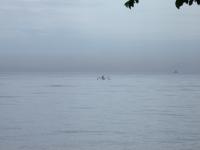 |
| Inspecting dinner's fish | I got to jam with these guys | Looking to Java | Outriggers |
Since I wasn't exactly rolling in dough, Wayne had asked his driver friend, Putu Jaya, about less expensive places to stay nearby. He suggested the Hotel Bali Taman, a place a mile or so down the road where his wife worked. I moved there for the next few days. The Hotel Bali Taman was also on the beach, and although it did not have the nice grounds like Puri Bagus, it was full of flowers and trees and had a pleasant atmosphere. Some of the trees had masks hanging in them; others had epiphytes like orchids; and there were small statues and blessings everywhere. I wasn't sure whether the epiphytes were tied in the trees just to get them started, or if for some reason they wouldn't grow there naturally in the urban environment.
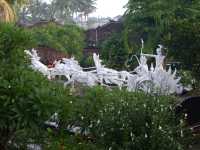 |
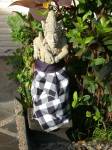 |
| Statue at Bali Taman Hotel | Small Statue |
 |
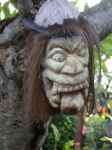 |
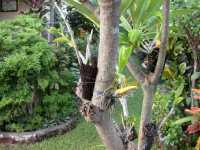 |
| Mask on Tree | Epiphytes tied to Tree |
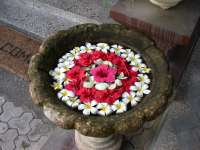 |
| A Bowl of Blessings |
Bali raises and exports a lot of rice, but many of her residents rely on tourism for their livelihood one way or another. Since the bombings south of Denpasar, the capital, tourism is down drastically. None of the hotels, from the fanciest to the least expensive, had more than 5% occupancy. Everywhere I went, people were desparate to make a sale of one sort or another. It was very sad, for these are some of the happiest, friendliest people in the world, on a gorgeous tropical island.
Early in the morning, the beach is empty, but as the day brightens the beach fills up. When I first wandered onto the beach in front of the hotel, I was approached by vendors selling things of every shape and description. Jewelry, sarongs, carvings... the usual touristy things. Fruit, chicken, a massage, a diving trip, a boat ride, a cock fight, a companion. Whatever you wanted, someone, somewhere, had it for sale. If the person you were talking to didn't have it, he or she knew someone who did and would run off and russle them up to be there shortly to sell it to you. Favors and commissions were frequent in this bustling free trade.
However, if you didn't really want to be bothered, the word soon went out, and you were pretty much left alone. If, on the other hand, you wanted to interact with everyone, that word went out also. Since I wasn't really much interested in buying stuff, I found it a bit awkward. I wanted to talk to people, but didn't want to feel obligated to buy things. There were so many of them, and all of them desparate to sell something. At one point later in my visit, I learned that the item I had bought from someone was the only sale they had made in two months.
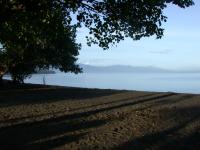 |
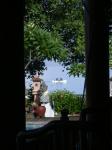 |
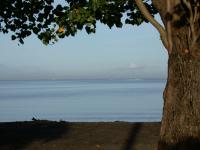 |
| Beach View, Bali Taman | Ocean View |
It seemed like every piece of ground that was level, or that could be made level, had rice or some other crop growing on it. The rice paddies were plowed either with a roto-tiller sized unit with large paddle-wheel like tracks, as in these pictures; or else by a pair of oxen / cows.
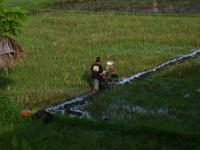 |
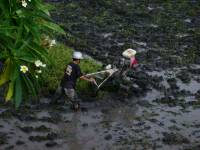 |
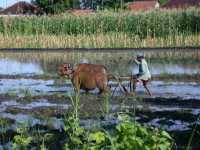 |
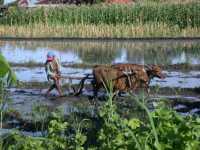 |
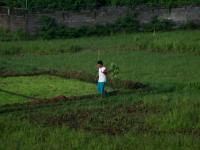 |
| Plowing rice | Rice Tractor | Oxen Plowing rice | Weeding? |
When we told Wayne's friend, our taxi driver, that I was interested in renting a motor bike, he volunteered a friend of his. So the next day, after I moved to my less expensive hotel, Agung Ngurah showed up with his brand new Honda 125. We agreed to a deal for three weeks at $3.50 per day. I didn't know until later, when I got a ticket for impeding traffic, that I was supposed to have an international driver's license. I got a ticket for that too. Don't ever pull off the road by a tower with policemen in it. They have nothing better to do, and it's some quick paola. I should have objected and told them I would be here to contest it in court, but I didn't. How could I be impeding traffic if I was off on the shoulder, and there was a lamp post two feet directly in front of me? I had to back the bike up to get it to the police tower so they could give me the ticket.
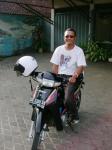 |
| Agung Ngurah and his Motorcycle |
Since I'm not licensed to drive a motorcycle in the states, let alone a crazy place like Indonesia, it seemed like a good idea to do a practice run. Agung thought so to, since it was his bike at stake. He was also very familiar with motorcycle accidents, having been in two. His right foot was still recovering, and was horribly swollen and had a huge scar from his last one, where he had the right of way but the car didn't yield. He was a particularly good instructor, I thought, and seemed to be particularly careful. So we headed up into the hills behind Lovina, me driving and him on the back.
Except for the main highways connecting three or four major towns, the roads in Bali are narrow. Generally steep and narrow. In many cases, both lanes together are narrower than a single lane in the United States. There often isn't a center line, and the rule seems to be "pass when able," and "get the hell over when you see two vehicles coming at once."
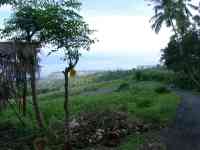 |
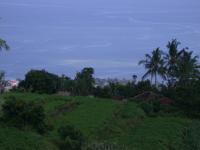 |
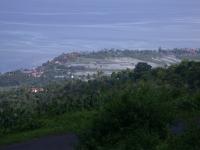 |
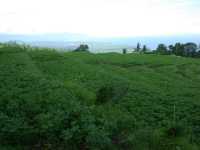 |
| Above Lovina | Looking down on a Reef | Rice Paddies near Lovina | Terraces of Peppers |
I don't believe I ever saw a herd of cows just grazing. There was usually only a solitary animal, staked out grazing on a tether, or in a tiny pen.
In the villages, people dried rice by spreading it out in the road. Because the roads are blacktop, it heats up quickly, and dries the rice faster than if it were spread anywhere else. I tried not to drive over it...
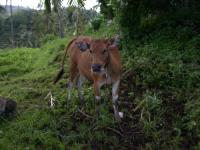 |
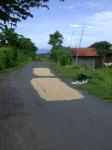 |
| Cow staked out | Drying Rice |
Agung returned the next day to give me a tour of the local countryside, (and help me a bit more in case I needed it on the bike, I'm sure). We rode up and around and over to the Brahma Asrama Vihara buddhist temple.
Then we rode down and around and over to the Komala Tirtha Hot Spring. If I had been here with my sweetie I would have stayed and soaked, but it didn't seem like it would be much fun by myself.
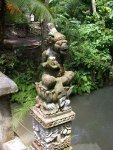 |
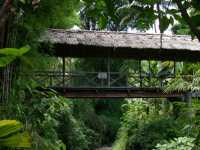 |
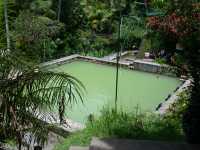 |
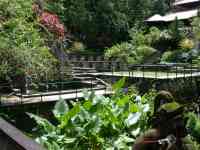 |
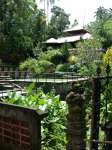 |
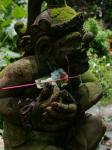 |
| Komala Tirtha Hot Spring |
There were flowers everywhere, they made just walking around enjoyable.
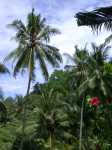 |
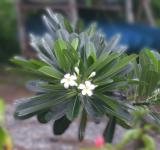 |
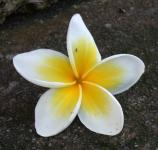 |
 |
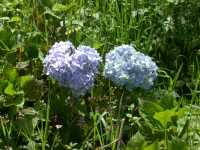 |
| Coconuts | Japun | Japun | Petalus Pinkus | Puffballus Blueus |
After that, I was on my own. I quickly learned that it was impossible to get really lost on Bali. There is no such thing as a dead end road. The roads wind up the ridges of the volcanoes, getting narrower and narrower and sometimes eventually turning to dirt; but eventually they wind steeply down to the creek between two ridges and back up the other side, and from there you can either work your way down and up again, going around the volcano, or head down the new ridge to near where you started.
I did this a lot. I put several thousand kilometers on the bike in three weeks, and Bali is only about a 130 kilometers (80 miles) in diameter.
Some of the larger towns or districts had big statues on the main road coming in, and occasionally ornamental arches over the road.
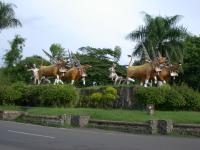 |
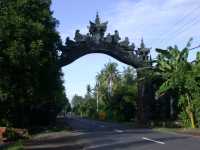 |
| Statue of Oxen Plowing Rice | Road Arch |
Winding up the steep mountain ridges on the bike was a kick in the pants. It made me feel like a kid again. I quickly decided to keep the visor on my helmet flipped up, so I could smell the countryside and hear the sounds, and so I could see better, and people I waved to could see me better. Since I'm from a tiny town in ranch country, I'm used to going slow and waving at everyone along the way, and I didn't see any reason to change. So as I putted along, I waved at everyone. Everywhere I went, people waved back, and when they saw my beard they broke into a grin and yelled "Hello."
There were steep rice terraces covering every hillside and ridgeside, eye-popping green, just like the pictures you see in coffee table books. The ridge next to the one you were riding on was just right over there, often covered with steeply terraced rice paddies. You were never far from a volcano. Indonesia is part of the "Ring of Fire." I read somewhere that there are so many people packed in such a small space with so many volcanoes that it is like putting the whole population of the United States in the state of Kansas along with seven active volcanoes. Bali, a small island about 80 miles in diameter, has at least four active volcanoes. No wonder people make offerings to the Gods five times a day.
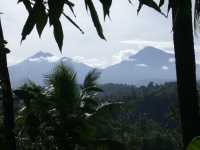 |
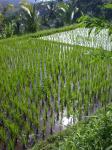 |
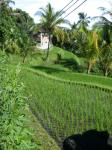 |
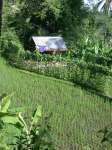 |
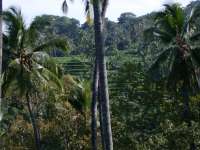 |
| Volcanoes | Rice paddies | Rice Paddy on Opposite Ridge |
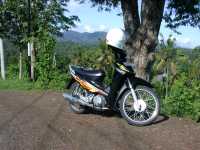 |
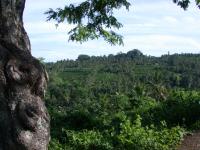 |
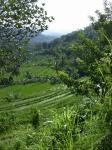 |
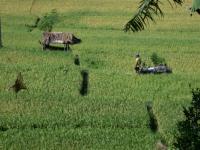 |
| My bike | Rice Terraces, House in Bottom | Rice Terraces | Rice Field Worker |
The road usually occupied the highest ground, and there often wasn't room for much else. You'd be riding along looking down on the roofs of houses on the sides of the ridge next to you.
There was a fair amount of construction going on, in spite of the depressed economy. The amount of stuff they held up with bamboo scaffolding was scary.
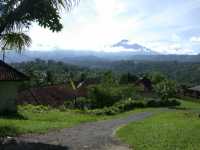 |
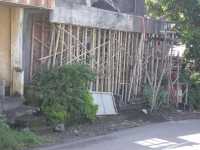 |
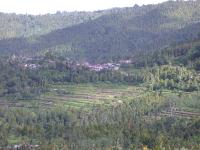 |
| That's a Road, not a Trail | Typical Scaffolding | Mountain Village |
Cock fights are now illegal on Bali, but they are still a regular part of life. I decided not to go to one, as I didn't want to be encouraging the practice. But I loved the hand made cages set up along the road.
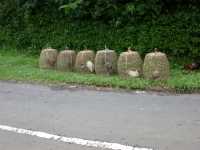 |
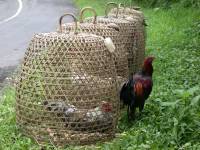 |
| Fighting Cocks |
The photos below should give a perspective on how narrow the roads are, and show that there is really not much of a shoulder; certainly never a paved one. The nice part about riding a bike is that you can still pull over just about anywhere and stop to enjoy the view. If you were in a car, you'd just have to blast on through.
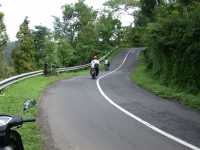 |
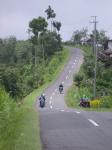 |
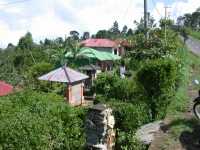 |
| Typical Major Highway | Note Houses below Road |
At a few places I came across some really pretty blessings; I would have liked to have some for decoration at home. My home could always use some blessing.
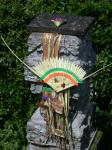 |
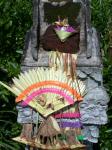 |
| Blessings |
One day I rode up and up, eventually getting to Lake Buyan and Lake Tamblingen. They are very pretty lakes, nestled in the bottom of old volcanic craters. Everywhere you look, you see the cones of old volcanoes sticking up.
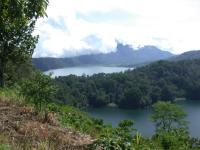 |
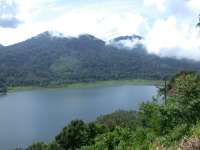 |
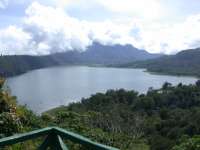 |
| Lake Buyan | Lake Tamblingen | Lake Buyan |
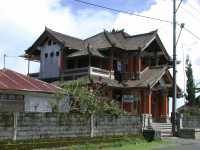 |
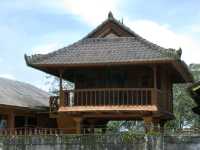 |
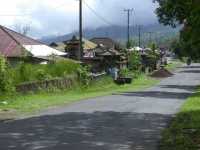 |
| Roadside Architecture |
From Tamblingen I continued down through the town of Yehmas, then over a pass to Lake Bratan. There were boatloads of macaques along the windy road down to Lake Bratan. When I stopped to take a picture, an old lady appeared immediately and pleaded me to buy some bananas to feed the macaques. I gave in, bought a few, and furthered their slow slide to an ignoble roadside scavenger.
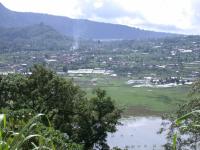 |
| Yehmas |
 |
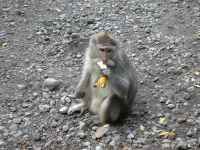 |
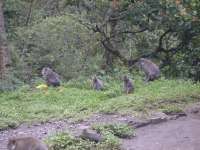 |
| Macque |
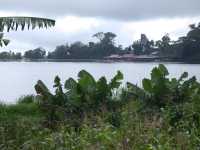 |
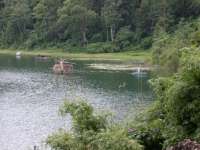 |
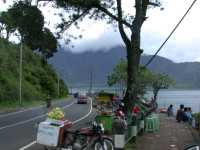 |
| Resort on Lake Bratan | Fishing Huts | Roadside Vendors |
Bali used to be 90% Hindu and 10% Muslim, but is now about 85% Hindu and 15% Muslim. There are not nearly as many Mosques as there are Hindu temples, but you do notice them, especially when it is time for a call to prayer.
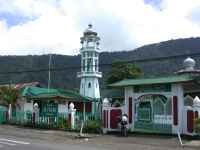 |
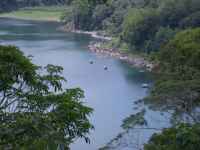 |
| Mosque | Fishing Huts, Lake Bratan |
The countryside was particularly colorful; I never tired of it, putting along on my bike.
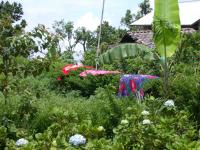 |
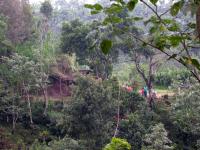 |
| Sarongs Drying | Family House in Jungle |
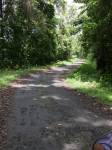 |
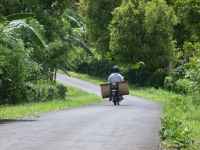 |
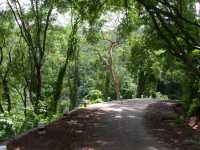 |
| Off the Beaten Path | Motorbike Panniers |
People on Bali generally live in a family compound. This consists of a small area surrounded by a fence, one or more sleeping buildings (houses), and in one corner, higher than all the other buildings, a family temple. Depending on how wealthy the family is, the houses and temple will be more or less elaborate. It seemed like the rich folks, like many people the world over, were out to impress their neighbors and passers by by building the fanciest temple and house they could afford.
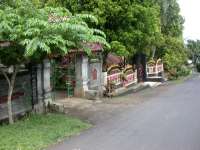 |
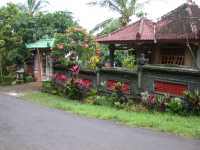 |
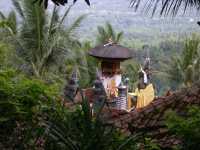 |
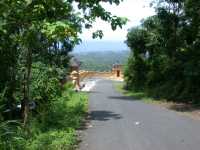 |
| Family Compound | Family Compound | Family Temple | Family Compound |
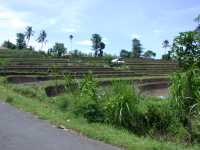 |
| Roadside Rice Terraces |
As I was coming down into a village on my way home, after a steep ride down a twisty ridgetop road, I noticed a thatched roofed building with a pool table. I waved, and someone yelled "Hello" as I went by. I pulled up a hundred yards farther on, hung a uey, and went back to see what was going on. I later discovered that just about every village has a pool table, and much like in a small town in the states, it's a gathering place. I learned a new game, lost a few bucks, learned a few more words on Bahasa Indonesian and Balinese, and made some friends. There was a good crowd by the time I pulled out. I took everyone's picture, and promised to return two days later and give them all one.
When I returned to hand out the pictures, one of the guys who spoke pretty good English, Putu Botak, invited me to his house. I followed him home, off the road and down a steep winding trail through the jungle. When we got there he introduced me to his family, and we had a good discussion about the world in general. While they like Americans, they weren't too keen on the war in Iraq. No big surprise there. The whole world thinks we're idiots; I agree. Putu had a swastika painted on the side of the house, and I asked him what it meant. It is, ironically, a Hindu symbol (of a God?) that wards off bad things, the black in all of us, to leave room for the white. Hitler got is backwards.
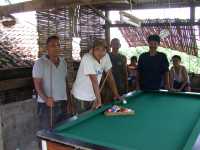 |
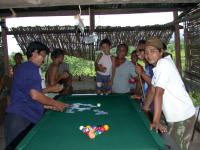 |
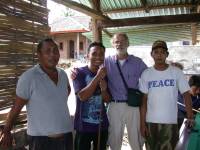 |
| The Pool Hall Gang |
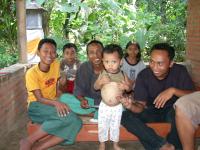 |
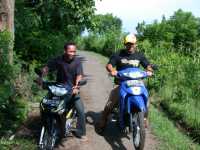 |
| Putu Botak and Family | Putu Botak and Friend |
The local fishing boats are colorful affairs, The smaller ones are dugout canoes with dual outriggers; the larger ones are planked and don't have outriggers.
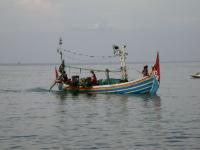 |
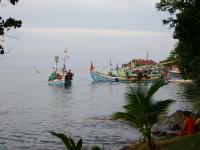 |
| Fishing Boat | Fishing Boats |
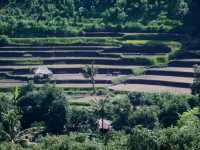 |
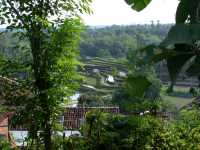 |
| Roadside Views |
At one point I ran into a motorcade heading someplace; I'm not sure what the deal was, but there were about a hundred bikes with people of all descriptions.
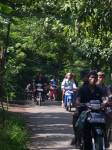 |
In a few places, I found people had birdcages hung up on high poles; I'm not sure why. But they were colorful and I enjoyed them, although I would have rather had the birds flying around free.
About my third day, I came upon this roadsign indicating a steep road. I was instantly worried, as everything I had been on was way steeper than any roads I've been on anyplace else. Really steep. But this one wasn't any worse than any of the others, and I'm still wondering why they bothered with the sign. Someone must have stolen it in the States, and taken it home as a souvenir.
There are small freight pickups every day, for things being sent to market. People just sit the stuff out by the road, and the truck picks it up. How they keep track of all of this is beyond me.
It rained almost every day, but then it also cleared off and was sunny almost every day. Because of all the rain, there are covered bus stops in a lot of places.
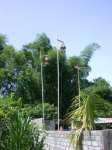 |
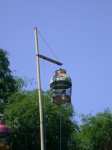 |
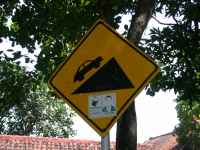 |
 |
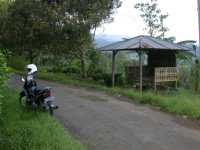 |
| Birdcages | Redundant Roadsign | Freight Pick Up | Bus Stop |
On one of my day trips exploring, I wound up one ridge to the town of Gobleg. I was stopped and looking at my map, which was full of errors. But it didn't matter. Whatever road you're on, it will be full of wonderful surprises. If you have a beard, don't shave it. A facial feature that sets you off, like blond hair, is a plus. America is some sort of Nirvana to Balinesians. Add a smile and a wave and your problem will be going anywhere, as everyone wants to invite you to their home to talk and meet their family. Komang came up and asked where I was going, then invited me in to see his wife's shop. I soon learned that everyone in Bali knows three English phrases: "Hello!", "Where're you going?" and "What's your name?" Most can't understand the answers you give, but if you hang around they usually tell you to wait, run off, and return with a sister or cousin or neighbor who speaks reasonable English.
 |
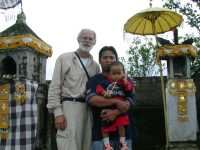 |
| Komang and Kid | Komang and Kid |
In my case, I usually didn't have an agenda, so "Where're you going?" wasn't an easy question to answer. I usually waved my arms and pointed up the road and said "Wherever this road goes." People would look at me strangely, and I just smiled.